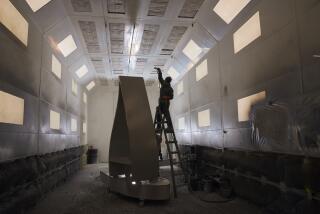Environmental Firms Cited as Key Source of New Jobs : Business: Demands for pollution-free new technologies and transportation will produce big revenues, a think tank predicts.
- Share via
WASHINGTON — Environmental concerns, once viewed as in conflict with the interests of business, will become a powerful engine driving a new industrial revolution, the Worldwatch Institute predicted in its annual assessment of world conditions released Saturday.
But for the time being, the Washington-based environmental think tank found the world still losing ground on many problems it addressed in its first report in 1984: pollution and the waste, over-consumption and depletion of natural resources by a rampantly expanding global population.
A fivefold growth in the world economy and a population expansion from 2.6 billion to 5.5 billion since 1950 “have begun to outstrip the carrying capacity of biological support systems and the ability of natural systems to absorb waste without being damaged,” institute President Lester Brown said.
“In country after country, demands for crops and for the products of grasslands, forests and fisheries are exceeding the sustainable yield of these systems.”
The report takes note, for example, of the unabated destruction of tropical forests, the over-harvesting of ocean fisheries and depletion of ground-water resources.
Institute researchers Christopher Flavin and John E. Young suggested, however, that the imperative of carrying out development in a way that preserves the environment already is shaping the global economy.
They cited statistics from the Organization for Economic Cooperation and Development that show a $200-billion market in 1990 for environmental goods and services, and projected that market will grow by 50% by the turn of the century.
Such numbers, they predicted, will be dwarfed by the demands for clean new technologies.
“The much larger demands of redesigning basic industrial equipment or creating new industries will likely be measured in the trillions of dollars,” they estimated.
“Businesses are likely to prosper in the future, not by selling massive quantities of identical products--the traditional route to economic success--but by meeting consumer needs in the most efficient way possible: supplying ‘energy services’ rather than electricity, ‘information’ rather than a newspaper and crop protection rather than pesticides.
“Environmentally related industries will be a major source of new jobs in the ‘90s,” they added. “In countries that fail to keep up with the pace of change, whether they are rich or poor, income growth and job creation will lag.”
As an example of a profound change already under way, they pointed to California’s new automobile emissions standards, saying their impact “has already ricocheted throughout the global automotive industry.
Since 1990, major manufacturers have accelerated work on prototypes of electric cars and announced work on hydrogen-powered vehicles, while others have plans for automobile bodies that are nearly all recyclable.
What this suggests to Flavin and Young is that “the automotive industry is about to undergo some of the most rapid changes since Henry Ford introduced the Model T. The gasoline-powered internal combustion engine, which has dominated transportation for most of this century and which survived the oil crisis of the ‘70s unscathed, may finally be on the way out.”
The report also suggests that the re-industrialized world must bring back the stalwart of the previous industrial revolution--the railroad.
Trains, battered by competition from automobiles, buses, trucks and airplanes, offer solutions to many modern transportation problems, potentially producing huge energy savings and relieving air and highway congestion, it says.
“An expanded role for rail could make expensive new airports unnecessary,” said Worldwatch analyst Marcia Lowe, “since so much air space in existing facilities is tied up by flights making short trips that easily could be made by train.”
Specifically, she suggested that a proposed new airport for Boston could be rendered unnecessary by $800-million worth of rail improvements in the Northeast corridor, at about a fifth the cost.
Unless governments adopt conservation and development policies leading to the kind of re-industrialization described by Flavin and Young, the world flirts with economic collapse, Brown suggested.
“Environmental degradation,” he said, “can no longer be considered a peripheral issue. If destruction of the economy’s support systems continues, growth in economic output could fall below that of population, pulling average incomes down for the entire world.”
“The bottom line is that the world is entering a new era, one in which future economic progress depends on reversing environmental degradation. This in turn is contingent on new economic and population policies.”
More to Read
Inside the business of entertainment
The Wide Shot brings you news, analysis and insights on everything from streaming wars to production — and what it all means for the future.
You may occasionally receive promotional content from the Los Angeles Times.










